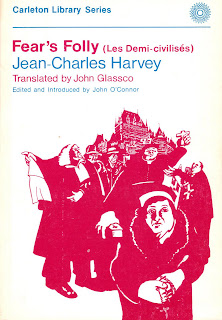
A comment left last week had me thinking – obsessing, really – about those horrible old New Canadian Library covers of my youth. That McClelland and Stewart used the series design for ten years begs the obvious question: Why?
It seems no one much liked them. In New Canadian Library: The Ross-McClelland Years, 1952-1978 (University of Toronto, 2008), Janet Friskney writes that from the start "booksellers, consumers, instructors, and students found the new cover art decidedly unappealing." I think the longevity is explained, at least in part, by those "instructors and students". Ms Friskney places them last, but they were very much at the front of NCL's sales. Captive readers, where else were they going to get The Tin Flute or The Double Hook?

That said, I wonder whether there wasn't something else going on. Ms Friskney tells us that in reacting to the design's poor reception Jack McClelland "balked at the kind of financial outlay another new cover would represent." I may be reading too much into Ms Finskey's use of "cover" as opposed to "design", but it occurs to me that each new cover must have been very cheap to produce. One simply positioned the text in the centre – more or less – of the appropriate box. No need to worry over images, never mind permissions, just choose from the abstracts provided by series designer Don Fernby. It seems any old one would do; the image used for Down the Long Table (above) is also featured on the covers of Susanna Moodie's Roughing It in the Bush, Ralph Connor's Glengarry School Days and no less than two Stephen Leacock titles (My Remarkable Uncle and Last Leaves).
The production values were extremely poor. With the new design, printing shifted from England's Hazell, Watson and Viney to our own T.H. Best. Not only did they use inferior paper, the new covers were invariably skewed. Worse still, even the gentlest touch appeared to cause injury. Though younger, some by as much as two decades, they usually show more wear than their earlier counterparts.

I do go on... perhaps because semester after semester, year after year, I was obliged to spend my meagre earnings on these ugly looking things. Yet, for all my complaints, I miss the content of the old NCL books. Offerings were diverse and often surprising. Germaine Guèvrement's The Outlander, Philip Child's God's Sparrows and Percy Janes' House of Hate have no place in the series' current safe and commercially-driven incarnation.
Right again, Joni Mitchell.








